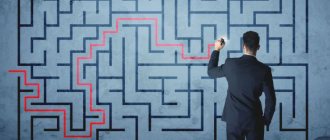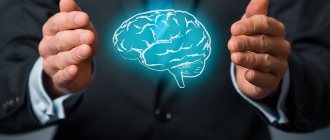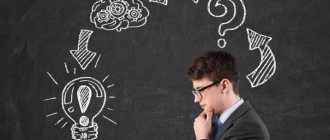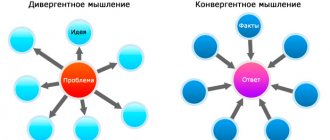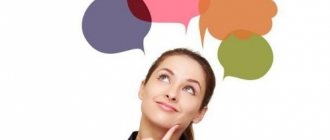Thinking in a broader sense means the combination of all conscious mental (mental) actions. In a narrower sense, we are talking about their most complex part, inherent in a specific person, providing abstraction and reflection.
Thinking moves from individual perception to general concepts, and through them to practical and theoretical perception of the world. The property is associated with sensory and spatial perception. It uses memory and creativity. This specific way of connecting, distinguishing, comparing and evaluating is significantly correlated with language, which is its means and, at the same time, its determining environment.
What it is
Every day, every person is faced with thousands of tasks that require solutions and affect his future life.
To make informed decisions, you need to think logically, sensibly assessing the situation. Often, the life experiences of friends and personal ones can be disappointing, and advice from the Internet can be useless, so you need to use your brain and develop logical thinking.
To better understand the definition of this word, let's break it down into its components: logic and thinking.
Logic is the science of correct thought processes, the ability to reason. It includes the skills to think consistently, based on real facts and arguments, without distorting them. This science studies the forms and laws of thinking, the course of inferences.
She has basic concepts and laws that help to understand any situation and solve a problem from the side of rationality and science, without emotional overtones that cloud the mind.
Logical laws are valid in any situation and are equally valid in mathematical problems and in life.
Thinking is a part of human brain and mental activity, the highest level of knowledge of reality. Thanks to it, we process information and are able to think, reason and draw conclusions. It is a distinctive human feature as a rational being. This process is characterized by generalization and cognition through the surrounding world.
Information comes to us through the sensory organs, and then we process it in the brain. The conclusion we draw depends on what motivates us and how we think. Objective reasoning includes logical thinking.
From these two definitions we can conclude that to develop logical thinking - the ability to process information based on logical laws and arguments, making an objective conclusion.
We often make bad decisions based on emotions, other people's advice, assumptions, fear or doubts. To avoid dilemmas and mistakes, you need to train your brain and instill in yourself the habit of reasoning logically without the interference of irrational phenomena. The brain loves difficulties and new knowledge, it trains just as well as muscles and bears the fruits of “pumping”. By performing certain exercises, clearly understanding the purpose of these trainings, you can completely change your thinking and become better, smarter, more reasonable.
Advance. Effective Reading
Description. Reading is the main tool for improving thinking, mastering new knowledge and skills. But what to do if it takes a lot of time to read one book, and half of the information immediately flies out of your head? In this case, a new online course from the Advance school “Effective Reading” will help you.
After completing the course, your vocabulary will become significantly wider. This means that you can establish constructive dialogues with people on a variety of topics. Successful communication is the key to success in your career and personal life.
In addition, after completing the courses you will be able to:
- read twice as fast as the current level, while all the information received will remain in your memory for a long time;
- concentrate on reading as much as possible, which will significantly improve perception;
- easily remember large amounts of text information and apply it where necessary;
- read aloud with perfect diction - anyone can easily understand you.
This program is based on seven unique speed reading techniques. And the main thing is that they are focused not only on the speed of reading books and useful articles, but also on broadening your horizons, concentrating your attention, improving your speech, enriching your vocabulary, etc. When your attention is completely focused on reading, you will begin to better assimilate any material. Consequently, its further application in practice will not be difficult.
The program includes 16 lessons and takes 1 month (if you watch one lesson in two days). The duration of each lesson is 80-120 minutes. They contain maximum useful information. And if you are not sure whether to take the training, the authors have prepared the first lesson for free. After viewing it, you will understand whether you need this course or not.
Authors: Advance.
Cost: the full price of the course is 20,000 rubles, but at the moment there is a discount, so the payment has been reduced to 14,900 rubles. You can get a free lesson on the course page.
Pass the course
What is it for
We constantly think, the brain does not stop activity for a second. A person processes tons of information every second, and in order to objectively assess what is happening, make the right decisions and make fewer mistakes, one must rely on logic. At first it will require effort, but then the brain will make the right decisions automatically because it will train.
These are not just single conclusions, but a chain of personal behavior, a way of life, part of individuality. The future depends on every decision, even if it seems insignificant. Having mastered the skill of thinking logically, a person is able to:
- choose a rational way to solve a life situation and find a way out;
- choose a quick and effective method to achieve your goals;
- calculate your competitors’ moves in advance, stay ahead and bypass them, anticipating every action;
- be able to conduct discussions, small talk, scientific debates and simply maintain a conversation;
- speak competently, concisely and understandably for everyone;
- draw conclusions based on your mistakes and become better every day, thanks to competent introspection and reflection;
- approach other people and yourself critically, soberly assess what is happening;
- master the art of oratory, influence other people by making compelling arguments;
- avoid outside manipulation, do not become a victim of deception and scams;
- be able to competently answer questions, twist the line of conversation in your favor, and not fall for the interlocutor’s tricks;
- do not succumb to self-deception and the Barnum effect - subjective confirmation based on a high assessment of the accuracy of the characteristics of your personality from generalized conclusions (horoscopes, tests, socionics).
Logical thought processes
We are all individuals and have unique experiences, however, similar processes occur in our brains that lead to information processing and inference.
Here are the main operations taking place in our head:
- Analysis. During this operation, our brain decomposes a phenomenon into several components in order to consider each of them separately, to identify its influence, relationship and impact. Any object or event has main elements into which the brain automatically breaks it down to process information.
- The opposite process to analysis is synthesis. This mental operation involves putting together small details and parts into a whole to assess the situation. A striking example of synthesis is putting together a puzzle.
- Comparison. This process requires finding the differences and similarities of an object/event relative to something. It can be superficial, incomplete, or deep, complete. Comparison is based on analysis, because in order to compare two objects, you need to mentally break them down into their components.
- Generalization. A process that combines objects or events into a single whole based on similar characteristics. We often use it to summarize.
- Specification. The exact opposite of the previous thought process. Its essence lies in the accuracy and determination of individual characteristics of an object/event, revealing its internal content.
- Abstraction helps a person to focus on a specific object or its feature, discarding extraneous ones. This is an isolated study of the characteristics of an object/event for deeper knowledge.
- Classification involves the use of a system for dividing objects according to certain criteria, is based on analysis and helps to organize objects/events for oneself.
Some mental operations are mutually exclusive, so you need to use certain types in appropriate situations. The choice of thought process depends on the goal that a person wants to achieve after processing information, which is why it is necessary to develop logical thinking.
Types of logical thinking
Logical thinking is a complex process of information processing. It comes in several types:
- Visual, effective, practical. It is based on observation, attentiveness, consideration of trifles and details, and the ability to use spatial images. Practical thinking is characterized by rapid switching between thoughts and actions, and vice versa. Theory and practice are applied equally.
- Visual-figurative. The essence lies in the images and ideas that arise in the process of processing received data from the outside. Common among children, imagination and images help them solve problems and understand the world.
- Abstract-logical. This type is based on the process of thinking itself, finding general patterns, operating with facts and categories.
Each type of logical thinking is important and necessary in its own way for an objective perception of reality and problem solving. But the most rational way of thinking is abstract-logical; it should be developed from early childhood and trained throughout life.
Forms of thinking
Thinking has three forms: concept, judgment and inference.
- The concept reflects a group of homogeneous objects through the fixation of their common essential characteristics.
- A judgment can be in the form of a statement, doubt, criticism, statement, etc. But its essence lies in establishing a connection between concepts, during which an opinion is formed.
- Inference involves mental work with judgments and concepts, their processing, and then making a new judgment. We often use two common types of reasoning: deductive and inductive.
Let's sum it up
Thinking is one of the cognitive processes. It's about working with information, ideas, concepts. It allows you to find connections and solve problems.
Mental functions are the formation of concepts, recognizing and finding relationships, reasoning, decision making, and creating something new. The result of thinking is new information (new knowledge). Therefore, the development of thinking in general or its individual types is an important step in achieving success, both in the personal and professional spheres.
Tips for developing logical thinking
Our brain loves to learn new things, think, face challenges and work. In order not to consume a lot of unnecessary information, but to engage in conscious self-improvement and develop logical thinking, you should perform the following exercises and follow the recommendations of experts.
Tip 1 . Read more. By consuming useful information that requires analysis, our brain trains, and we become multifaceted and well-read individuals. You should not chase the number of pages and books you read, the main thing is quality. Analyze, reason, make predictions: how the book will end if it is fiction, take notes if it is non-fiction.
Tip 2 . Play educational games. These include various board games, chess, checkers, backgammon, Scrabble, various riddles, puzzles, and a Rubik's cube. This helps you develop and have fun with your friends at the same time.
Tip 3 . Spend at least 15 minutes every day doing exercises to develop logic. You can engage in solving mathematical problems, building logical chains, arranging words or events in a certain order, making logical judgments based on the laws of logic.
Tip 4 . Solve crosswords, scanwords, puzzles, riddles. This not only brightens up your leisure time, but also perfectly develops your thinking. You can buy a magazine the old fashioned way or solve it online, fortunately there are a lot of similar puzzles now.
Tip 5 . Learn foreign languages. New information always has a beneficial effect on brain activity, especially regular training in another language. Sign up for courses in the city or online, or study on your own through mobile applications. This will not only help improve your thinking processes, but also develop your horizons, allow you to travel around the world and make friends of different races and nationalities. This will lead to an exchange of information that helps to penetrate another culture and mentality.
Tip 6 . Play association games. This helps to simultaneously develop both imaginative and logical thinking.
Tip 7 . Changing your hand when performing everyday tasks helps you look at routine processes differently and uses a different part of your brain.
Tip 8 . Come up with original ways to use objects. Helps you discover your inner creative and find unusual uses for ordinary things.
Tip 9 . Take up the study of natural sciences. These include physics, chemistry, astronomy, biology, geology, and geography. This way you will obviously become smarter and expand your knowledge about the structure of the world. And maybe you’ll find a new hobby or purpose in life.
Tip 10 . Have debates and reasoned arguments with your friends. It’s not enough to know a lot; you need to be able to use your knowledge in the form of arguments. Argue, search for the truth, exchange new information, learn to express your thoughts correctly, listen to your interlocutor, and conduct a constructive dialogue.
Main features
You can recognize synthetics by the following features:
- Developed intuition . Synthetics often cannot explain why they are confident in a particular development of events, but their premonitions very rarely deceive them.
- Losing details from sight, inattention to them . It is difficult for synthetics to go from the particular to the general; specifics interest them only if it helps to better understand some features of the general.
- The ability to “grab” information “on the fly”, quickly understand the essence . Synthetics subtly sense the interlocutor, often giving the impression of people who seem to read minds.
- The ability to see patterns within a whole . An analytical doctor treats a specific disease and relieves its symptoms, while a synthetic doctor tries to understand the cause of the disease and its effect on the functioning of other organs.
- Predominance of the right hemisphere, responsible for intuitive, imaginative, visual perception . You can check which hemisphere is dominant in you using a simple test, which is described in the video below.
